Labour or labor may refer to:
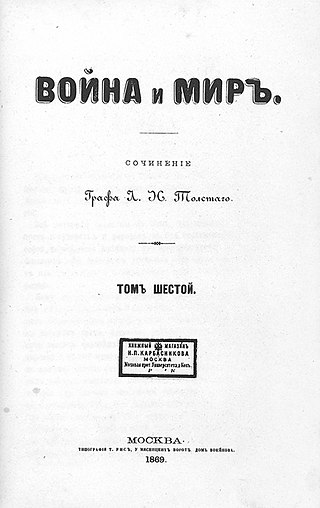
War and Peace is a literary work by Russian author Leo Tolstoy. Set during the Napoleonic Wars, the work mixes fictional narrative with chapters discussing history and philosophy. An early version was published serially beginning in 1865, after which the entire book was rewritten and published in 1869. It is regarded, with Anna Karenina, as Tolstoy's finest literary achievement and remains an internationally praised classic of world literature.

The Tolstoyan movement is a social movement based on the philosophical and religious views of Russian novelist Leo Tolstoy (1828–1910). Tolstoy's views were formed by rigorous study of the ministry of Jesus, particularly the Sermon on the Mount.

The Kingdom of God Is Within You is a non-fiction book written by Leo Tolstoy. A Christian anarchist philosophical treatise, the book was first published in Germany in 1894 after being banned in his home country of Russia. It is the culmination of 30 years of Tolstoy's thinking and lays out a new organization for society based on an interpretation of Christianity focusing on universal love.

Ilya Yefimovich Repin was a Ukrainian-born Russian painter. He became one of the most renowned artists in Russia in the 19th century. His major works include Barge Haulers on the Volga (1873), Religious Procession in Kursk Province (1880–1883), Ivan the Terrible and His Son Ivan (1885); and Reply of the Zaporozhian Cossacks (1880–1891). He is also known for the revealing portraits he made of the leading Russian literary and artistic figures of his time, including Mikhail Glinka, Modest Mussorgsky, Pavel Tretyakov, and especially Leo Tolstoy, with whom he had a long friendship.
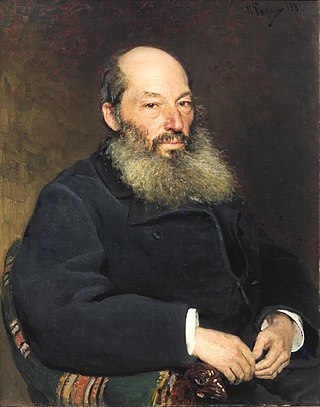
Afanasy Afanasyevich Fet, later known as Shenshin, was a renowned Russian poet regarded as the finest master of lyric verse in Russian literature.
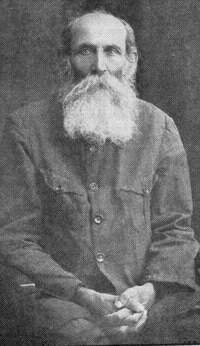
Aaron David Gordon, more commonly known as A. D. Gordon, was a Labour Zionist thinker and the spiritual force behind practical Zionism and Labor Zionism. He founded Hapoel Hatzair, a movement that set the tone for the Zionist movement for many years to come. Influenced by Leo Tolstoy and others, it is said that in effect he made a religion of labor. Gordon moved to Ottoman Palestine in 1904, at age 48, where he was revered by younger Zionist pioneers for leading by example.
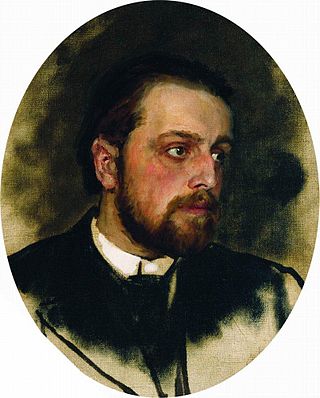
Vladimir Grigoryevich Chertkov (Russian: Влади́мир Григо́рьевич Чертко́в; also transliterated as Chertkoff, Tchertkoff, or Tschertkow was the editor of the works of Leo Tolstoy, and one of the most prominent Tolstoyans. After the revolutions of 1917, Chertkov was instrumental in creating the United Council of Religious Communities and Groups, which eventually came to administer the Russian SFSR's conscientious objection program.
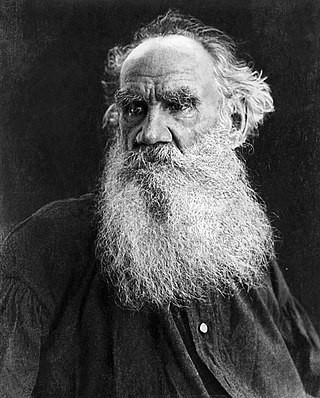
This is a list of works by Russian writer Leo Tolstoy (1828–1910), including his novels, novellas, short stories, fables and parables, plays, and nonfiction.

Gleb Ivanovich Uspensky was a Russian writer and a prominent figure of the Narodnik movement.
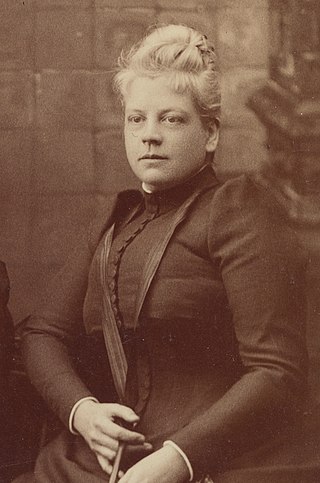
Isabel Florence Hapgood was an American ecumenist, writer, and translator, especially of Russian and French texts.
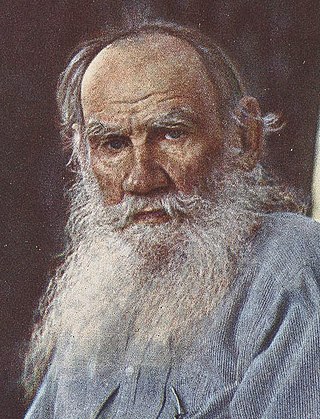
Count Lev Nikolayevich Tolstoy, usually referred to in English as Leo Tolstoy, was a Russian writer. He is regarded as one of the greatest and most influential authors of all time. He received nominations for the Nobel Prize in Literature every year from 1902 to 1906 and for the Nobel Peace Prize in 1901, 1902, and 1909.
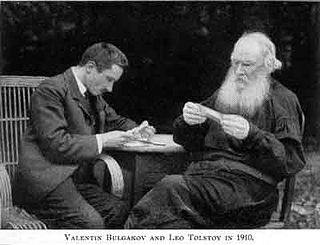
Valentin Fyodorovich Bulgakov was the last secretary of Leo Tolstoy and his biographer. He served as the director of several literary museums and actively participated in Tolstoyan and pacifist initiatives. Endured imprisonment under the Tsarist regime and internment in a Nazi camp. For the last 20 years of his life, he assumed the role of the head at the Yasnaya Polyana museum.
Toil means literally intensive work, and may refer to:
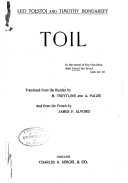
The Triumph of the Farmer or Industry and Parasitism is a treatise by Russian peasant philosopher Timofei Bondarev. The work details Bondarev's labor philosophy, in particular his idea of "bread-labor", by which every man is responsible for the physical labor required to sustain himself. The treatise captivated writer Leo Tolstoy, who began a long correspondence with Bondarev and endeavored for years to see the work published. An abbreviated version was published in 1888, and the full work was published in 1906.

Count Sergei Lvovich Tolstoy was a composer and ethnomusicologist who was among the first Europeans to make an in-depth study of the music of India. He was also an associate of the Sufi mystic, Inayat Khan, and participated in helping the Doukhobors move to Canada.

"Peasants" is an 1897 novella by Anton Chekhov. Upon its publication it became a literary sensation of the year, caused controversy but in retrospect is regarded as one of Chekhov's masterpieces.
The Inevitable Revolution is an essay written by Leo Tolstoy on July 5, 1909 about abolishing the law of violence and replacing it with the law of love. It is generally considered a text on civil disobedience, pacifism, and anarchism, and it is Tolstoy's last non-fiction work detailing his final opinions on political, economic, and religious issues.
"A Landowner's Morning", also translated as "A Morning of a Landed Proprietor" is a short story by Leo Tolstoy written and published in 1856, early in Tolstoy's career. It is a fragment of Tolstoy's unfinished Novel of a Russian Landowner.

"Thou Shalt Not Kill" is an article by Leo Tolstoy. Written in 1890, it was immediately censored by the Russian censors, and was finally published on August 8, 1900. It is about how rulers, kings, and presidents are murderers for ordering armies to commit murder, and how the assassinations of such rulers should come as no surprise.















